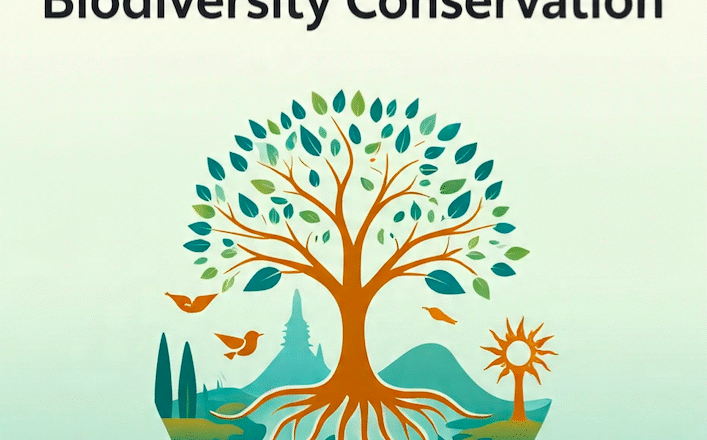Ecosystem Services and Biodiversity Conservation
- Description
- Curriculum
- FAQ
- Notice
- Reviews
- Grade
This course provides a comprehensive exploration of ecosystem services and biodiversity conservation, delving into the critical links between the health of natural systems and human well-being. We’ll begin by defining the different types of ecosystem services—provisioning, regulating, cultural, and supporting—and their fundamental importance to our societies and economies. The curriculum will then shift to an in-depth look at biodiversity, its various levels, and the major threats it faces, from habitat destruction to climate change.
This comprehensive 6-week course is designed to equip you with the essential skills needed to create and implement an effective conservation plan. Through a series of hands-on lessons and practical activities, you’ll learn how to transform a conservation idea into a well-researched and actionable strategy.
The course is structured into six modules, with an estimated time commitment of 2 hours per week. This flexible format allows you to progress at your own pace while building a strong foundation in conservation science and practice.
The course culminates in a final Capstone Project, where you will synthesize your knowledge into a single, cohesive conservation plan. You have the choice to work on a hypothetical case study provided by the course or to apply your skills to a real-world environmental issue in your own community.
Upon successful completion of all course requirements, you will be awarded a verifiable digital certificate to recognize your achievement and demonstrate your expertise in conservation planning.
You will learn various methods for valuing ecosystem services, including both economic and non-monetary approaches, to better understand their true worth. Building on this foundation, we will investigate a range of conservation strategies, from the establishment of protected areas and sustainable land-use planning to the power of community-based conservation and restoration ecology. The course culminates in a capstone project where you will apply these concepts to develop a detailed conservation plan for a real-world ecosystem, demonstrating your ability to think critically and creatively about conservation challenges.
Course Objectives
- To introduce the foundational concepts of ecosystem services and biodiversity and assess their importance to human well-being.
- To provide learners with the skills to value ecosystem services and analyze the major threats to biodiversity.
- To equip learners with an overview of key conservation strategies and guide them in designing effective plans.
- To enable learners to synthesize all course concepts into a comprehensive and evidence-based conservation plan.
Learning Outcomes
Upon successful completion of this course, learners will be able to:
- Analyze and evaluate the critical connections between ecosystem services, biodiversity, and human well-being.
- Apply valuation methods to assess ecosystem services and threats, thereby determining their impacts on biodiversity.
- Develop and design a range of effective and justified conservation strategies for a specific scenario.
- Synthesize all course concepts to produce and present a detailed, feasible, and evidence-based conservation plan.
What Learners Will Gain
By the end of this course, you will possess a deeper understanding of the importance of ecosystems and biodiversity, and you will gain:
-
Theoretical Knowledge: A strong conceptual foundation in ecosystem services, biodiversity, and conservation science.
-
Practical Skills: The ability to analyze environmental threats, apply valuation methods, and design effective conservation plans.
-
Critical Thinking: The capacity to think critically about complex environmental challenges and propose creative solutions.
-
Real-World Application: The experience of applying course concepts to a practical, capstone project that simulates a professional conservation planning process.
-
A Portfolio Piece: The capstone project serves as a tangible example of your skills and knowledge, which can be shared with potential employers or academic institutions.
-
11.1: What are Ecosystem Services?40 minsThis lesson is part of a scheduled release. It will become available at: 2025-08-25 00:00
Welcome to the start of our journey. In this first lesson, we'll establish a foundational understanding of a term you've likely heard before: ecosystem services. By the end of this lesson, you will be able to define ecosystem services, recognize their vital connection to human well-being, and categorize them into their four main types.
-
21.2: Ecosystem Services and Human Well-being40 minsSorry, this lesson is currently locked. You need to complete "1.1: What are Ecosystem Services?" before accessing it.
In our previous lesson, you defined the four types of ecosystem services. Now, we'll take that understanding a step further by exploring the profound and direct ways these services connect to your daily life, your health, and your community's prosperity. By the end of this lesson, you will be able to articulate the links between ecosystem services and human well-being, and identify practical examples in different ecosystems.
-
3Knowledge Checkpoint - Ecosystems Services and Biodiversity Conservation Module 115 questionsSorry, this lesson is currently locked. You need to complete "1.1: What are Ecosystem Services?" before accessing it.You've learned the fundamental concept of ecosystem services and how they are critically linked to human well-being. This quiz is designed to help you review the four main categories of services and their importance.
-
42.1: What is Biodiversity?40 minsThis lesson is part of a scheduled release. It will become available at: 2025-09-01 00:00
Welcome to Module 2. In our last module, you explored how the services provided by ecosystems are fundamental to human well-being. Now, we'll dive into the concept of biodiversity, the foundation upon which all ecosystem services are built. By the end of this lesson, you will be able to define biodiversity and understand its three distinct levels, recognizing its critical importance for both ecosystems and humanity.
-
52.2: Threats to Biodiversity40 minsSorry, this lesson is currently locked. You need to complete "2.1: What is Biodiversity?" before accessing it.
In our last lesson, you learned what biodiversity is and why it's so important. Today, we will confront the other side of the coin: the major threats that are causing an unprecedented rate of biodiversity loss around the globe. By the end of this lesson, you will be able to identify and describe the primary drivers of biodiversity loss and analyze their impacts through real-world case studies.
-
6Knowledge Checkpoint - Ecosystems Services and Biodiversity Conservation Module 215 questionsSorry, this lesson is currently locked. You need to complete "2.1: What is Biodiversity?" before accessing it.You now have a solid understanding of biodiversity at its three levels and the major threats it faces. This quiz will test your knowledge of these concepts and your ability to identify the different drivers of biodiversity loss.
-
73.1: Economic Valuation of Ecosystem Services40 minsThis lesson is part of a scheduled release. It will become available at: 2025-09-08 00:00
Welcome to Module 3. In the first two modules, you built a strong foundation in understanding ecosystems and the variety of life they support. Today, we will introduce a new concept: how to value these services, starting with economic methods. By the end of this lesson, you will be able to describe why we use economic valuation for ecosystem services and apply basic market and non-market-based methods to a real-world scenario.
-
83.2: Non-Monetary Valuation of Ecosystem Services40 minsSorry, this lesson is currently locked. You need to complete "3.1: Economic Valuation of Ecosystem Services" before accessing it.
In our previous lesson, you learned how to put a number on some of nature's benefits. Today, we'll turn our attention to the other side of the coin: the invaluable benefits that cannot, and often should not, be measured in monetary terms. By the end of this lesson, you will be able to describe the importance of non-monetary values and use a structured method to assess them.
-
9Knowledge Checkpoint - Ecosystems Services and Biodiversity Conservation Module 315 questionsSorry, this lesson is currently locked. You need to complete "3.1: Economic Valuation of Ecosystem Services" before accessing it.You have explored the powerful methods for valuing nature's benefits. This quiz will check your understanding of both economic valuation (using market and non-market methods) and non-monetary valuation.
-
104.1: Protected Areas40 minsThis lesson is part of a scheduled release. It will become available at: 2025-09-15 00:00
Welcome to Module 4. Having understood the value of ecosystems and the threats they face, you're now ready to explore the actions you can take to protect them. This lesson will focus on one of the most widely used and recognizable conservation strategies: the establishment of protected areas. By the end of this lesson, you will be able to identify different types of protected areas, evaluate their effectiveness, and recognize the challenges associated with their management.
-
114.2: Sustainable Land-Use Planning40 minsSorry, this lesson is currently locked. You need to complete "4.1: Protected Areas" before accessing it.
In our last lesson, you learned about protected areas. While they are a crucial strategy, they only cover a fraction of the planet's surface. Today, you'll focus on a broader approach: sustainable land-use planning. By the end of this lesson, you will be able to define the principles of sustainable land-use planning and analyze successful initiatives that integrate conservation with economic and social needs.
-
124.3: Community-Based Conservation40 minsSorry, this lesson is currently locked. You need to complete "4.1: Protected Areas" before accessing it.
You've explored top-down strategies like protected areas and integrated planning. Now, we will look at a bottom-up approach that puts people at the center of conservation: community-based conservation. By the end of this lesson, you will be able to describe the importance of community engagement in conservation and analyze the success factors of community-led initiatives.
-
13Knowledge Checkpoint - Ecosystems Services and Biodiversity Conservation Module 415 questionsSorry, this lesson is currently locked. You need to complete "4.1: Protected Areas" before accessing it.You've learned about a variety of powerful conservation strategies, from establishing protected areas to engaging communities in conservation. This quiz will test your knowledge of these different approaches and the core principles that make them successful.
-
145.1: Conservation Planning and Management40 minsThis lesson is part of a scheduled release. It will become available at: 2025-09-22 00:00
Welcome to Module 5. In our previous module, you explored a variety of conservation strategies. Now, we'll shift our focus to the practical steps of putting those strategies into action. This lesson will teach you the fundamentals of conservation planning and management. By the end, you will be able to outline the key steps in developing and implementing a conservation plan, a skill that is essential for your capstone project.
-
155.2: Restoration Ecology40 minsSorry, this lesson is currently locked. You need to complete "5.1: Conservation Planning and Management" before accessing it.
Building on the principles of conservation planning, today's lesson focuses on a specific and powerful implementation tool: restoration ecology. By the end, you will be able to describe the principles of ecological restoration and identify the key steps for planning a successful restoration project.
-
165.3: Policy and Advocacy for Conservation40 minsSorry, this lesson is currently locked. You need to complete "5.1: Conservation Planning and Management" before accessing it.
In the final lesson of this module, we'll examine one of the most powerful and far-reaching tools in your conservation toolbox: policy and advocacy. By the end of this lesson, you will be able to explain the importance of policy in conservation and outline a basic strategy for effective advocacy.
-
17Knowledge Checkpoint - Ecosystems Services and Biodiversity Conservation Module 515 questionsSorry, this lesson is currently locked. You need to complete "5.1: Conservation Planning and Management" before accessing it.This quiz is your chance to demonstrate your understanding of how to put a conservation plan into action and build a strategy for real-world change.
-
186.1: Monitoring Ecosystem Services and Biodiversity40 minsThis lesson is part of a scheduled release. It will become available at: 2025-09-29 00:00
Welcome to Module 6, the final instructional module before your capstone project. Throughout this course, you've learned to understand, value, and plan for conservation. Today, you'll learn a critical final step: how to know if your hard work is making a difference. This lesson will focus on monitoring, the process of systematically collecting data to track the health of ecosystems and the progress of your conservation efforts. By the end, you will be able to design a monitoring plan for any project.
-
196.2: Evaluating Conservation Effectiveness40 minsSorry, this lesson is currently locked. You need to complete "6.1: Monitoring Ecosystem Services and Biodiversity" before accessing it.
In our previous lesson, you learned how to monitor, or collect data. Now, we will complete the cycle by learning how to evaluate that data. Evaluation is the process of using your monitoring data to judge the success of your project and learn from your experience. By the end of this lesson, you will be able to design a framework to evaluate the effectiveness of any conservation plan.
-
20Knowledge Checkpoint - Ecosystems Services and Biodiversity Conservation Module 615 questionsSorry, this lesson is currently locked. You need to complete "6.1: Monitoring Ecosystem Services and Biodiversity" before accessing it.This final quiz is designed to assess your understanding of the principles and methods of monitoring and evaluation in conservation. The questions will cover key concepts from both Lesson 6.1 and 6.2, including techniques for monitoring ecosystem services and biodiversity, as well as frameworks for evaluating the effectiveness of conservation strategies.
Important Course Notice
We are excited to announce that the Ecosystem Services and Biodiversity Conservation course will officially begin on August 25, 2025.
To ensure a thorough and manageable learning experience, all course lessons will be delivered progressively. New lessons will be "dripped" to you on a weekly basis, giving you ample time to engage with the material, complete assignments, and participate in discussions before moving on to the next topic.
We believe this approach will help you better absorb the key concepts and successfully complete all associated tasks. We look forward to seeing you in the course!

This is an advanced course that assumes a foundational knowledge of basic biology or environmental science. While there are no formal prerequisites, a background in a related field would be beneficial. Learners will need access to a computer with internet access to conduct research for the capstone project and access course materials. There are no specific software requirements.
This course is designed for a broad audience interested in environmental issues and conservation. It is particularly well-suited for:
-
Undergraduate and graduate students in environmental science, biology, ecology, geography, and public policy.
-
Professionals working in conservation organizations, government agencies, and non-profit sectors.
-
Land-use planners, environmental consultants, and policymakers seeking to integrate ecosystem services and biodiversity considerations into their work.
-
Anyone with a strong passion for environmental protection who wants to develop a deeper understanding and practical skills in conservation.
About This Site
Home to business, personal and career resources. Get the assistance you need for continuous business and professional development!
Search Content
- Quiet Quitting: The Silent Killer of Your Business
- 5 Signs Your Management May Be Considering Replacing You
- 3 Steps To Creating A Career Plan That Works For You
- Commit To Be Happy
- How To Tell If Someone Is Lying
- Persuasion Techniques
- 3 Job Search Tips That Increase Your Success
- 3 Points You Should Negotiate When You Are Losing Your Job
- How to Answer Interview Questions About Handling Stress
- The Secret to Having a Greater Impact at Work
- How to enhance new skills acquisition with tiny breaks
- Did you know?
- How to shift the tide of self-confidence
- The Key To Self Discipline
- How gossip, often viewed as harmless fun, can ruin careers.
- Whatever it takes, is what needs to be done to get the answers you need!
- Are You Really What You Eat ?
- 4 Ways to Create an Attitude of Gratitude
- How to Find the Drive, No Matter What
- Bank Teller Interview Questions







